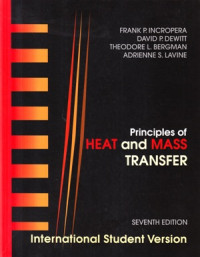Text
Principles of heat and mass transfer
In the Preface to the previous edition, we posed questions regarding trends in engineering education and practice, and whether the discipline of heat transfer would remain relevant. After weighing various arguments, we concluded that the future of engineering was bright and that heat transfer would remain a vital and enabling discipline across a range of emerg¬ing technologies including but not limited to information technology, biotechnology, phar-macology, and alternative energy generation.
Since we drew these conclusions, many changes have occurred in both engineering education and engineering practice. Driving factors have been a contracting global econ¬omy, coupled with technological and environmental challenges associated with energy pro¬duction and energy conversion. The impact of a weak global economy on higher education has been sobering. Colleges and universities around the world are being forced to set prior¬ities and answer tough questions as to which educational programs are crucial, and which are not. Was our previous assessment of the future of engineering, including the relevance of heat transfer, too optimistic?
Faced with economic realities, many colleges and universities have set clear priorities. In recognition of its value and relevance to society, investment in engineering education has, in many cases, increased. Pedagogically, there is renewed emphasis on the fundamen¬tal principles that are the foundation for lifelong learning. The important and sometimes dominant role of heat transfer in many applications, particularly in conventional as well as in alternative energy generation and concomitant environmental effects, has reaffirmed its relevance. We believe our previous conclusions were correct: The future of engineering is bright, and heat transfer is a topic that is crucial to address a broad array of technological and environmental challenges.
In preparing this edition, we have sought to incorporate recent heat transfer research at a level that is appropriate for an undergraduate student. We have strived to include new examples and problems that motivate students with interesting applications, but whose solutions are based firmly on fundamental principles. We have remained true to the peda¬gogical approach of previous editions by retaining a rigorous and systematic methodology for problem solving. We have attempted to continue the tradition of providing a text that will serve as a valuable, everyday resource for students and practicing engineers through¬out their careers.
Ketersediaan
Informasi Detail
- Judul Seri
-
-
- No. Panggil
-
536.2 Inc p
- Penerbit
- New Jersey : Wiley., 2013
- Deskripsi Fisik
-
xxiv, 1048 hal. : il. ; 25 cm.
- Bahasa
-
English
- ISBN/ISSN
-
9780470646151
- Klasifikasi
-
536.2
- Tipe Isi
-
-
- Tipe Media
-
-
- Tipe Pembawa
-
-
- Edisi
-
Ed. VII
- Subjek
- Info Detail Spesifik
-
-
- Pernyataan Tanggungjawab
-
-
Versi lain/terkait
Tidak tersedia versi lain
Lampiran Berkas
Komentar
Anda harus masuk sebelum memberikan komentar

 Karya Umum
Karya Umum  Filsafat
Filsafat  Agama
Agama  Ilmu-ilmu Sosial
Ilmu-ilmu Sosial  Bahasa
Bahasa  Ilmu-ilmu Murni
Ilmu-ilmu Murni  Ilmu-ilmu Terapan
Ilmu-ilmu Terapan  Kesenian, Hiburan, dan Olahraga
Kesenian, Hiburan, dan Olahraga  Kesusastraan
Kesusastraan  Geografi dan Sejarah
Geografi dan Sejarah